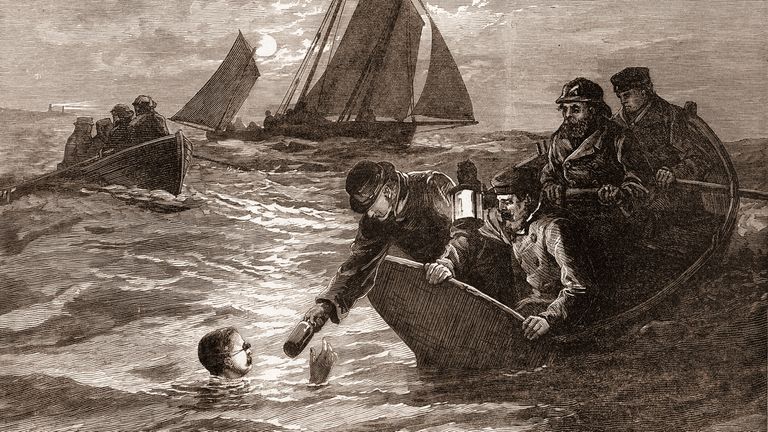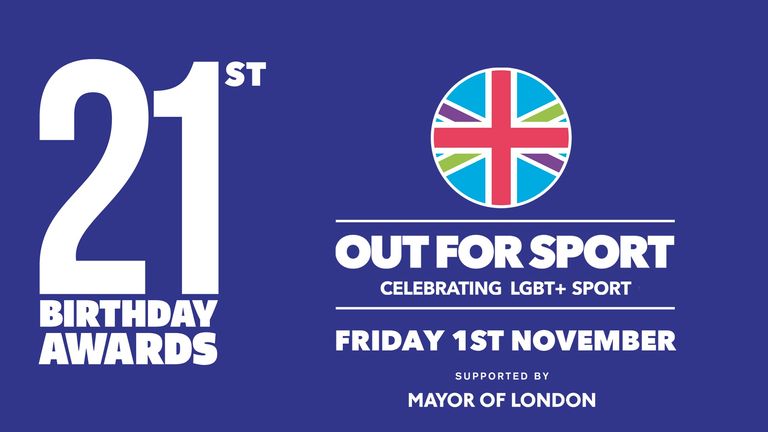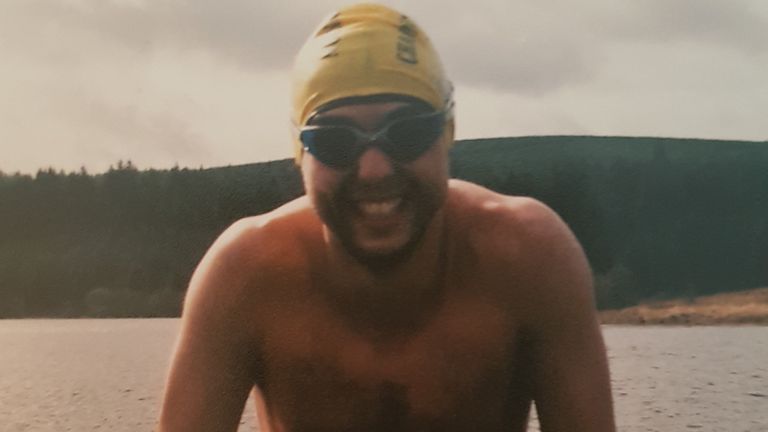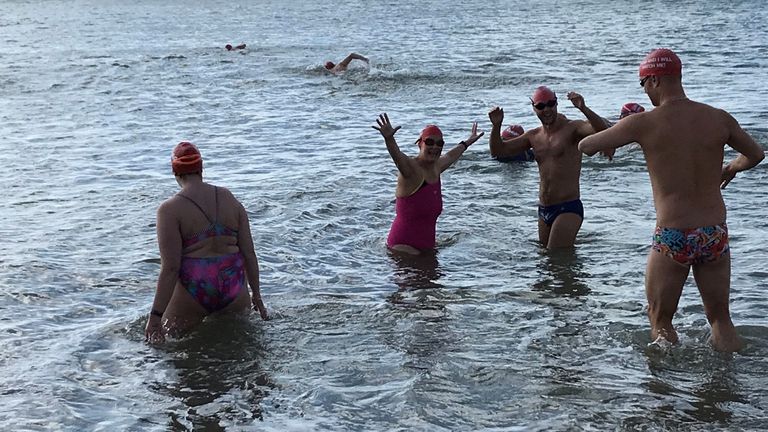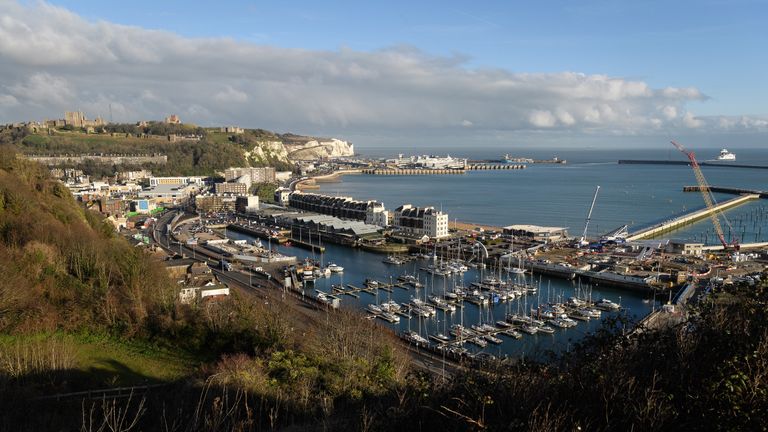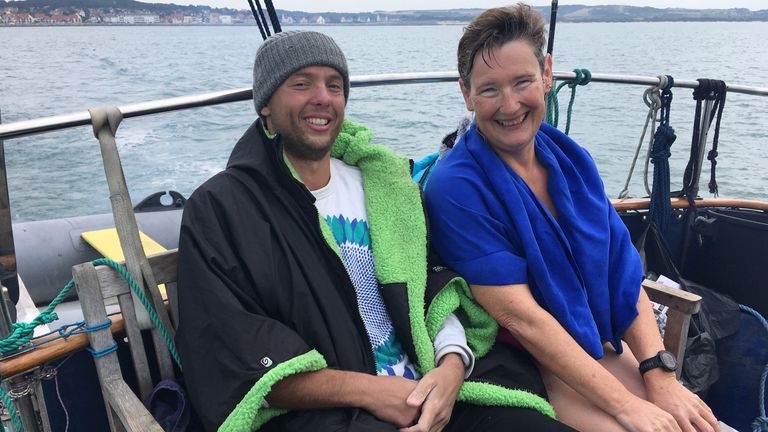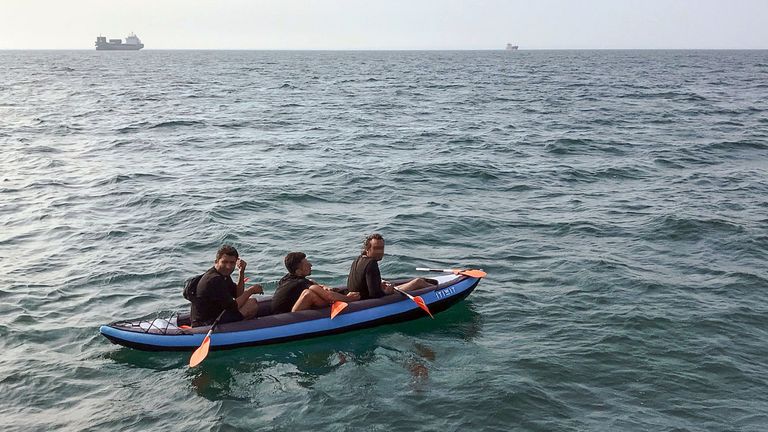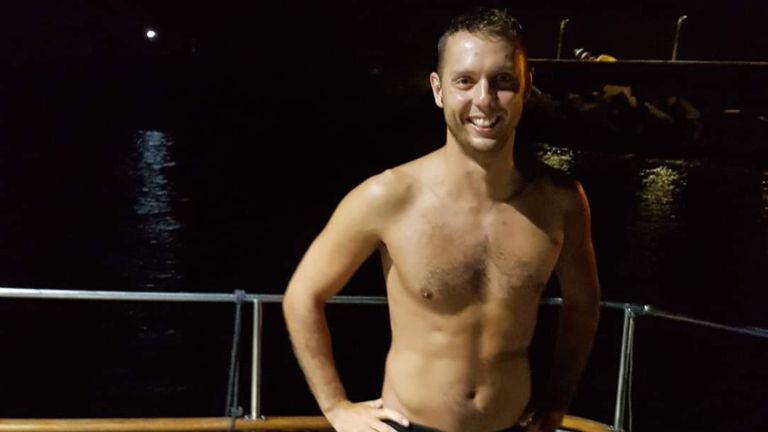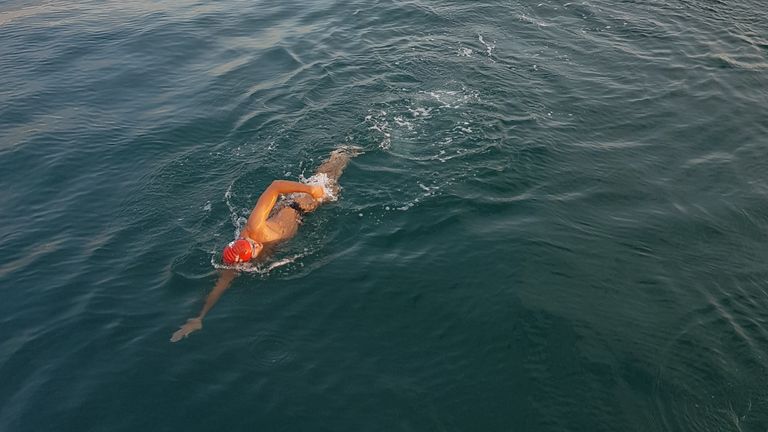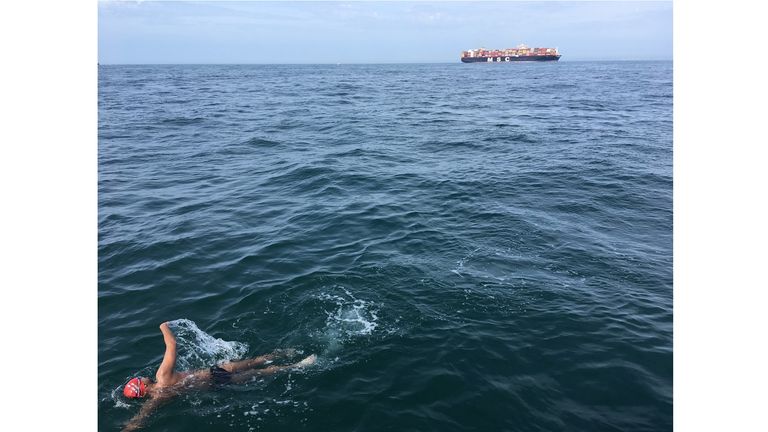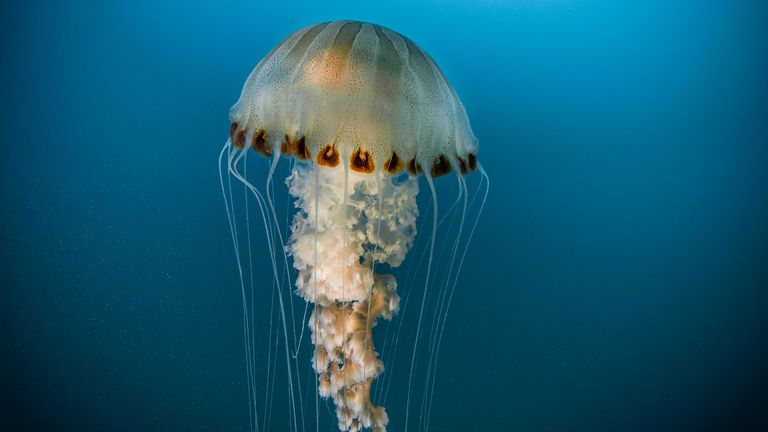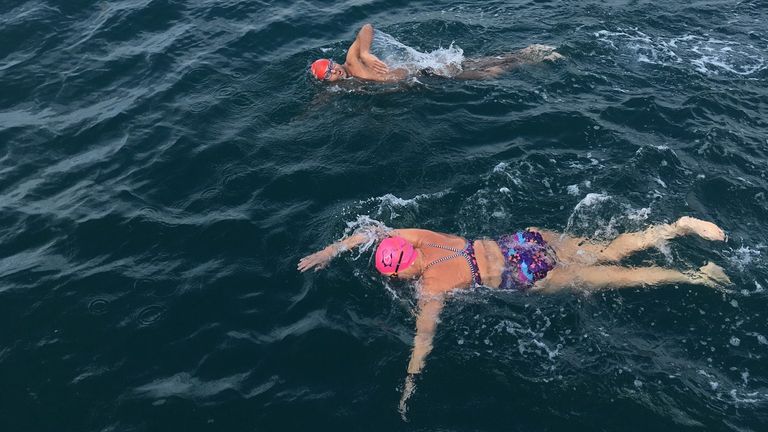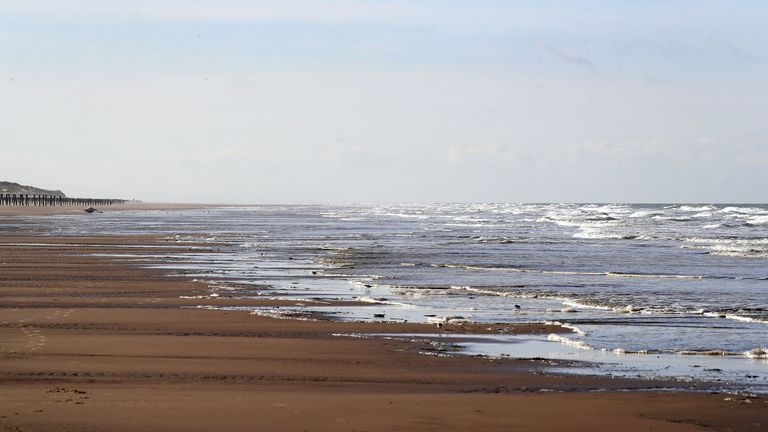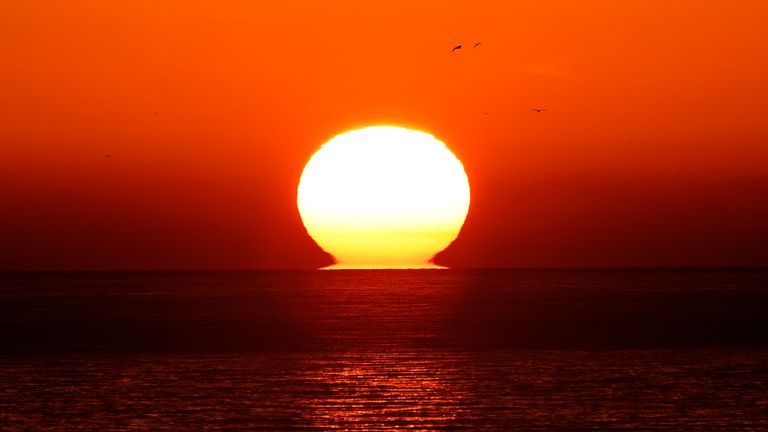Swimming the Channel: Out For Sport awards nominee Hunter Charlton's story
Accompanied by 'Dementors' and debris, fuelled by jelly babies and taking on jellyfish, Hunter Charlton attempted to join an elite group of cross-Channel swimmers. He shares his story
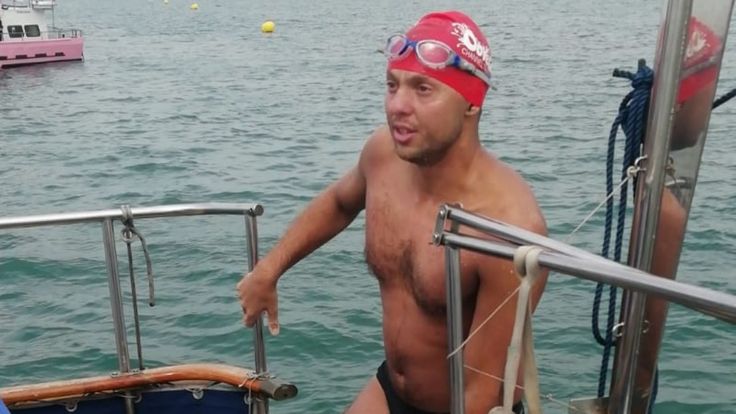
Friday 1 November 2019 15:36, UK
When life threw Hunter Charlton off course, he needed a goal to focus on - and chose the swim from Dover to Calais. Yet he was only a recreational swimmer. Was this too great a challenge?
Since Captain Matthew Webb completed the first recorded swim of the English Channel in 1875, many more people have attempted one of the sport's most intense endurance tests. However, in those intervening 144 years, only a little over 2,000 swimmers have successfully completed the 21 miles from England to France.
In August, Hunter Charlton attempted to add his name to that list. The 27-year-old was only a casual swimmer when, "at a low ebb", he made the decision to take on the punishing challenge. He'd run a number of marathons in the past, but crossing the Channel would take him well outside his comfort zone.
Ahead of Friday night's Out For Sport 21st Birthday Awards at London's City Hall, an event celebrating LGBT+-inclusive sport in London and the South East in which Hunter is nominated in the Outstanding Achievement category, he shares his story with Sky Sports...
Every Channel swimmer needs a narrative to keep them going. One part of mine is that I live with HIV.
Initially, I did marathon running as a way of dealing with that. I was at university in Bristol when I was initially diagnosed, and had no previous relationship with sport whatsoever.
After receiving such a huge shock, it felt like my life was spiralling downwards. Back then, it took three years before I was able to access medication on the NHS. I'm glad to report that's changed now, and the NHS offers medication at the point of diagnosis. But for me, I felt like I'd lost control, and I needed a way to bring that back into my life. Sport and physical activity gave me discipline, and meditative benefits too. It helped me to rescue my mental health, and I went on to run London and Brighton for the Terrence Higgins Trust (THT), raising thousands of pounds for the charity.
I moved to London in 2015, and I've always kept active with running, cycling and a bit of recreational swimming. However, a year ago, life threw me off course again. I'd been fired from my job; I broke up with my boyfriend; and the documentary I'd been working on (I'm a videographer) felt like it was slipping through my fingers. I was feeling cut adrift, uncertain about my career, and unable to reverse all these changes in my life. Then, one October day, I was hit by an AA van while cycling to London Fields Lido for a swim. The accident split my cycle helmet clean in half. It almost killed me.
Later, back home - lying in the bath covered in cuts and bruises - a seed of an idea I'd had for a short while started to grow, and quickly became something I couldn't ignore. I decided I'd swim the Channel. It sounds silly in that context, but that's where my head was at. I was at rock bottom, and needed to pounce on a way to build myself back up again, get me the hell out of London, and put me in a different environment. I wanted to have a mastery over something, and take control again. Even though I was far from being an endurance swimmer, my mind was made up.
I did some Googling, and contacted a boat pilot through the Channel Swimming and Piloting Federation, even sending over a deposit of £1,500 to the boat captain who would eventually guide me across. I had very quickly committed myself to the challenge. It was only then that I took a step back and thought, 'how am I going to do it?' I looked for swimming clubs, and starting out with 'LGBT-inclusive' in the search, Out To Swim was the first hit.
Aqua therapy
I went along to one of their welcome sessions, having mentioned in my email that I was planning to swim the Channel. I was introduced to Vicki Carter, who it turned out was training for the same endeavour. There was general excitement about the fact we shared the same goal, although she was understandably rather sceptical about my ambitions - she's a lifetime club swimmer who takes the sport very seriously, and here was me being unbelievably blasé about the whole thing. She gently interrogated me over lunch to work out my motives; I think she was impressed with my swimming ability too. We became firm friends.
As I said, there's a narrative behind every Channel swim. One of Vicki's story threads was raising money for Out For Sport, which is the umbrella group for all the LGBT+-inclusive sports clubs across the capital and south-east region, including Out To Swim. Vicki is a co-chair of both organisations, and one of the most passionate and hard-working volunteers you'll ever meet. Her dream was to put on an awards event that would celebrate all the achievements that the various clubs and individuals in the region's wider LGBT+ sports community had attained, to mark OFS's 21st birthday.
Since then, I've spoken to many more Channel swimmers about why they do it - for some, it's a way to help get over an addiction, depression, or abuse. For all the swimmers, the motive is crucial. During those long hours in the water, you have a lot of time to ruminate on your own thoughts. It's aqua therapy.
Another thing I learned was that my gung-ho entry into Channel swimming wasn't necessarily a bad approach. The advice coming back was to basically not overthink it - just sign up, and start training. And in hindsight, if I'd been told the time and money commitment, and the logistical nightmare involved, there's no way I'd have ever agreed to do it. So going in in a state of complete ignorance was the best thing. If I was aware I'd literally be spending every weekend for six months just hanging out with some old geezer in Dover, staying with him overnight, swimming in the harbour for 13 hours across the weekend...
That training began in earnest last November, and continued to the date of my swim. I thought you could train for it like you do a marathon - two or three swims a week, a long one on a weekend - but I quickly realised it was nothing like that. I was spending around 10 to 20 hours in the water every week. It's a gruelling process but you just have to go with it.
I'd been training on my own at first - I'd ask friends to come and watch me at the Serpentine or Hampstead Lido, to make sure I did a full stint - but joining Out To Swim helped me step it up, with more cardio work and variation. Vicki and I agreed to be each other's support swimmers - she was going to do her Channel swim in July, and I was scheduled for September.
The prescriptive advice is to train by hours, not miles. It's not about what distance you can really tolerate, but more about the amount of time you can expose yourself to the cold, saline water. We started building up for that a few months before, to the point where we could do three hours at 12 degrees, which was unlike anything I'd ever experienced. You're almost verging on hypothermia. You get out of the water, and you're shaking uncontrollably - you can't hold a drink, and you can barely even get dressed because you're so cold. But you have to go through that barrier to know what your limits are. The coldest swims that I went on were up in Scotland, swimming in 10 degrees in Loch Ness for up to two hours. It was unbelievably intense.
Then from May, I'd drive down from London to Dover on Friday nights, and swim for seven hours on Saturday and six on Sunday, doing lap after lap of Dover Harbour. I'd drive back on Sunday evening not being able to lift my arms above my head because I was so knackered.
Safe Passage, and pride
Through all this monotonous swimming, there was always a nagging thought that I could be using the time more effectively - learning German, doing volunteering, anything but this. Having a charity to support was a good way to help me focus. Reading up, I was becoming more aware of the major issue that you see as a Channel swimmer or as a pilot out in the Dover Strait - the migrant issue. My boat captain would later tell me that on a clear night, you're almost guaranteed to see light vessels making the opposite journey across. I've been to the Calais Jungle in the past to film a documentary, so Safe Passage - which exists to help unaccompanied child refugees and vulnerable adults find safe, legal routes to sanctuary - seemed like the right charity to support for this adventure.
That became another part of my personal Channel swim story - and as well as joining Out To Swim, I also went to sessions put on by Positive Strokes, which is a coached swimming group for people with HIV which meets once a week in London. This was the first time in the eight years since my diagnosis that I'd come into contact with men and women happy and open to talk about having HIV. While in no way does the virus define us, for many people - myself included - this is the only interaction we have with others who share this condition. So much about HIV is the feeling of otherness and loneliness; just meeting up and doing something as simple as swimming creates a huge sense of pride and community.
In June, I went to Weymouth to do my six-hour qualifier - that has to be swum in water that's 15 degrees or below, to show you're ready to make an attempt. By this time, the training was really taking its toll. Your life goes on hold completely when you're training for the Channel. I was having to focus entirely on this one objective, and I'd ended up neglecting friendships as a result. I was also only working freelance and part-time, and the swim was costing me thousands. As well as the £1,500 deposit, I'd have another £1500 to pay for the boat to accompany me on the actual swim. There was also the expense of going back and forth to Dover for training, paying for accommodation, and food. Your calorie intake doubles, so your shopping budget goes up accordingly. But it felt like a once-in-a-lifetime moment.
Green light to go
Vicki's attempt the next month was a success. I swam alongside her for a time, as part of her support crew, and she made it over to Calais in a time of 14 hours 40 minutes. She was such an inspiration to me. I don't think I could have made it across the Channel if I hadn't have met her and become a part of Out To Swim. Soon after, I decided to pull my own swim forwards by nearly two months. I just felt ready - I'd done another 13 hours of swimming that weekend, and was raring to go. I called my boat captain on the Monday to say, 'when's your next available spot?' He said there was one that Saturday night. I gulped. It was do-or-die time.
Perhaps it was a sign of nerves, but I then started to develop a chesty cough, so that added to my stress levels. I took a lot of long baths that week, accompanied by the audiobook of Moby Dick. I knew I'd need my brain to be active as I swam, to distract me from either the cold, the pain, or negative thoughts. Filling my head with fiction would help. Fortunately, I felt I'd shaken off the cough by Saturday, when the pilot called me in the morning to get the green light.
We convened in Dover Harbour on a pitch-black night - me, Vicki and my other friends on the support crew - with the sound of P&O ferries rumbling around us. My adrenaline was coursing, like I was about to step into the boxing ring. On the boat, I paid the rest of the fee, showed my passport, and ran through all the checks with the official observer from the Channel Swimming Association, including giving an emergency contact. We set out for Samphire Hoe, the official start point, as I went through my final preparations.
The repetitive strokes and hardness of the water irritates your skin, so I needed protection to stop any chafing. When Captain Webb achieved the first successful Channel swim nearly a century and a half ago, he was slathered in porpoise oil, which apparently didn't do much for him. I went for Vaseline - Vicki's partner Oonagh greased me to the gills in it.
Wearing just my hat, goggles and Speedos, I stepped down the ladder and touched the water with a feeling of invincibility. I paddled onto the land, and stood underneath the huge white chalk cliff. It was like I could feel the weight of it pushing down on me. The boat signalled with a torch to say that the swim was beginning. I stepped through the shingle into the water, going deeper and deeper, hoping the next time I was on solid ground, I'd be in France - however long that was going to take.
The first few hours were torturous. Apart from a few times in the past when I'd been drunk and messing around, I'd never swam at night before. It's disorientating, like being in a sensory deprivation chamber. You can't see anything, and all you feel is the sea around you - the waves, motion, and rhythm of the water. I was following the boat closely, trying not to touch it, like how a baby whale hugs its mother. My mental state became increasingly fragile. That first hour was overwhelming; the distance felt incomprehensible. It was the longest hour of my life.
At one stage, a garfish - a long, thin fish - swam right up to me. That was actually quite reassuring - a sign of life - as normally you only ever see jellyfish in the Channel. Yet it was only a brief respite. I'm head down, doing front crawl, staring into the gloomy murk of the Dover Strait.
In my head was a thought that kept repeating - that I didn't really matter. The 'Dementors' were coming for me. I felt like I wasn't going to make it, that I should abort the swim, save everyone on the boat the bother, and let them go home and get a good night's sleep. I had to break the whole swim down. The longest I'd ever done was seven hours. I felt I could make it to seven again. But after that?
I didn't want to show the crew that I was scared. The only interactions I had with them in that time were brief moments to feed, roughly every hour. The first took just eight seconds, enough to eat a jelly baby and take a swig of CNP, which is liquid carbohydrate heated up. It's like putting petrol in a car; you can feel it energising you. Sometimes they'd give me coffee with honey in it. The longest feed I had took a minute. A stick with a small basket at the end would be held out to me, similar to what you'd use to catch goldfish at a fair. Often, I'd drop whatever small snack I was given, such as a chunk of banana, or a slice of Eccles cake packed full of vital calories.
The darkness continued to envelop me, in every sense, as I crawled along slowly and the stopwatch approached the five-hour mark. I wasn't even halfway. Then, gloriously, the day began to break. It was like the breath of God. I was already sure I could hit seven hours but now I could literally see a way forward beyond even that. I'd kept myself alert, I was feeling strong, my arms were OK, and I was still working off some adrenaline.
There was another sublime moment to savour - in the wake of an iron ore tanker, I saw dolphins playing and frolicking off the bow wave. With the sun now gently warming my back, there was nothing for me to do but swim, and be aware of the environment all around me.
'Overwhelming relief'
In the middle of the Channel, the sea is actually beautifully clear - you might think you were in the Med. The water temperature would eventually rise to 17 degrees. I don't look like a Channel swimmer - they're bulky, not like extreme athletes, while I'm quite slight-framed. Beforehand, I was worried the cold was going to be my biggest obstacle, but it was fine in the end. Your body does learn to acclimatise, and you don't need that extra fat and blubber.
There wasn't too much in the way of rubbish and plastic either. Channel swimming has become a much cleaner activity than in the 70s, when oil and garbage were common.
What you do so see are monstrous, 30,000-ton tankers zooming up and down at around 25 knots. They say the turning circle of one is roughly four miles. And then there's our little pilot boat, the equivalent of a snail moving across the M25, with me alongside. The captain would turn his engines on, overtake me so that I'd be at the back, then turn his engines off until I'd swam to the front - before doing it all again. I was moving parallel to the shorelines too, with the tide - so for every step forward, I'm taking seven or so steps left or right. It's painstaking.
Halfway through the swim, you reach what's called the separation zone, which is in between two shipping lanes. Imagine the central reservation point on a motorway, but one that's collected a crust of garbage, seaweed - and jellyfish. You have to almost punch through it and with every stroke, you're getting stung. Some are light brushes; others are aggressive, like being stung by a wasp. I had marks on my wrists and arms that looked like I'd been self-harming. I was also reminded at one point of Safe Passage, the charity I was swimming in aid of. We came across two canoes that were making the journey from Calais to England. Both had to be rescued by helicopters.
Vicki got in the water at hour nine, and we swam an hour together, side by side. There's no verbal communication, but just having the knowledge that someone is alongside you - for companionship - means so much. By the time I got to hour 10, France was in sight. At that point, there was nothing on earth that was going to stop me. I could almost make out villages, and the spire of a church. I knew I could make it.
Feeling those grains of sand pull through my fingers when at long last I arrived on a beach somewhere near Calais is difficult to describe. In that moment, the sense of relief was overwhelming. A few sunbathers on the beach came over to shake my hand. A large man in speedos presented me with "un petit souvenir", a small stone pebble for my endeavour, and I became very emotional.
My official time was 14 hours and 40 minutes, strangely the exact time as my mentor, Vicki. I sat on the beach for a moment, trying to sight England in the distance but could only see an empty horizon meeting the sky.
I'd achieved something I had never thought possible - not just swimming across this enormous 'ditch' of water, but also overcoming barriers of self-doubt.
Since my swim, Gareth Thomas has publicly shared his story of living with HIV, doing so the day before completing the Ironman Wales triathlon. Medication and treatment have improved so much in the last two decades. HIV is no longer a death sentence but a chronic condition which is easily managed, normally by taking just one pill a day. But despite these medical breakthroughs, stigma around HIV still remains. When I was diagnosed with HIV in 2013, there were almost no celebrities, no role models, who were publicly out about their status. Ignorance thrives in silence. Through Gareth telling his story, I hope this encourages more people to feel able to disclose their status without fearing judgment, persecution or rejection.
I met many people from all ages and walks of life, all on the same journey as me with the same goal. I can think of no other sport where so much physical and mental vulnerability is exposed. The months of preparation are brutal - sitting practically naked and semi-hypothermic on a pebble beach in Dover, having spent the previous five hours thinking about your life, is definitely not for everyone.
Yet before the Channel, I'd been in therapy, frustrated with work and relationships, and depressed. Building up through the gruelling training schedule and eventually making it across, I regained a sense of self-worth and respect.
From Olympians, amputees and cancer survivors, I believe anyone can take on the 'Everest of swims'; the most interesting aspect of the challenge is simply mental, and finding individual strategies of bending the seemingly impossible.
Story edited by Jon Holmes. The Out For Sport 21st Birthday Awards are being held at City Hall in London on Friday night, with Hunter and Out To Swim both nominated.
Later in November, Sky Sports will again be proudly supporting the annual activation of Stonewall's Rainbow Laces campaign for LGBT+ inclusion in sport. Interested in sharing a story that could help to empower others? Get in touch here.
